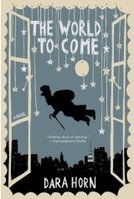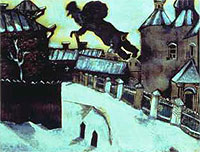
I picked up a copy of
The World to Come for my vacation to Amsterdam, because I had read some great reviews, and it caught my eye because both this book and her other book (which I just ordered) both have to do with art. The art in question is a painting by Chagall, who also appears as a character in the novel. It's a sweeping story about multiple generations of a Jewish family, with dramatic themes of trust, creativity, and time. Horn is an expressive writer, whose descriptions of color and space easily match the joyous visuals of Chagall's work. She writes:
Color, color, bold, loud colors, colors that sang, colors that hummed, colors that screamed, colors that sobbed, or more often than anything else, colors that seethed, angry, bitter, unlooked at, unnoticed, darkening not from age but from loneliniess, from knowing that they do not exist without someone to see them - Sara did not merely see them, but heard them, smelled them, tasted them, touched them.
The World to Come has the emotional complexities of Safran Foer's excellent
Everything Is Illuminated and
Extremely Loud and Incredibly Close. Like Safran Foer, Horn sensitively blends the highly charged histories of her characters - involving real-life events like war and terrorist attacks - without taking advantage of the emotional power or cheapening the meaning.
For me, the most interesting parts of the book were those in which the characters grappled with the concepts of what happens to us before we're born and after we die - and how the cycle of life so frequently occurs at the same time - that we lose and gain family members at the same time (a phenomenon I'm experiencing myself lately). She ties these ideas to Jewish parables (by the writer Der Nister, or Pinkhas Kahanovitch), allowing the characters to explore them spiritually and independently.

According to an interview in the back of the book (the paperback), Horn began writing this story after a Chagall painting,
Study for 'Over Vitebsk,' (the same work in the book) was stolen from the Jewish Museum in New York. You can learn more about that story by listening to
this audio report from NPR. Read the
first chapter online, but I encourage you to read the rest as well.
 Mostly I was interested in the chapter on Amsterdam hookers in No Touch Monkey - recommended by a friend. It's re: the law of the Red Light District: Don't photograph the hookers. Halliday is one of those $20 a day (or less) travellers - she's really into sleeping on park benches and proud of the good funk she gets going after wearing the same clothes for weeks on end and not showering. There's a time and a place for all that, sure - but for me that time and place has passed.
Mostly I was interested in the chapter on Amsterdam hookers in No Touch Monkey - recommended by a friend. It's re: the law of the Red Light District: Don't photograph the hookers. Halliday is one of those $20 a day (or less) travellers - she's really into sleeping on park benches and proud of the good funk she gets going after wearing the same clothes for weeks on end and not showering. There's a time and a place for all that, sure - but for me that time and place has passed.  I Wish Someone Were Waiting for Me Somewhere is a book of short stories translated from the French. Some are breathtaking, but some are kind of lame. Each story has a similar voice and tone, making them somewhat difficult to differentiate. Neither book is holding my attention, and I just got In the Image by Dara Horn, so I'm going to move on to that one.
I Wish Someone Were Waiting for Me Somewhere is a book of short stories translated from the French. Some are breathtaking, but some are kind of lame. Each story has a similar voice and tone, making them somewhat difficult to differentiate. Neither book is holding my attention, and I just got In the Image by Dara Horn, so I'm going to move on to that one.






